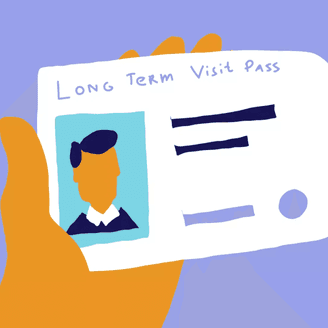- Osome Blog SG
- Singapore Long-Term Visit Pass (LTVP): Beginners’ Handbook
Singapore Long-Term Visit Pass (LTVP): Beginners’ Handbook
- Modified: 3 October 2024
- 12 min read
- Foreigner's Guide


Melissa Yeo
Business Writer
Melissa's unique storytelling expertise makes a difference for small business owners and entrepreneurs. Her background in content and social media spans eight years in various industries, including publishing, ecommerce and marketing. At Osome, she makes everything about running a business less intimidating. From specific accounting and bookkeeping advice to insights for company growth, Melissa's articles help you to take the next step on your entrepreneurship journey.

Jiaping Zhang
Reviewer
Jiaping, CA Singapore and SCTP member, is our Corporate Tax Manager based in Singapore with a decade of expeience on Singapore corporate tax. With in-depth knowledge about Singapore corporate tax law and regulations, she can help with corporate tax compliance that matters to every company.
If you're a foreign national but wish to stay in Singapore for over 30 days, you will have to obtain a Long-Term Visit Pass (LVTP).
With an LTVP, you can stay in Singapore for a period of up to two years, and the pass can be renewed for subsequent periods. The LTVP is different from other types of visas in Singapore, such as the Employment Pass, which is issued to foreign professionals, managers, and executives who are employed by Singapore companies; or the Student Pass, which is issued to foreign students who wish to study in Singapore.
In a nutshell, the LTVP is specifically designed for those who wish to stay in Singapore for a longer period of time without having to apply for a new visa every few months.
What Is a Long-Term Visit Pass in Singapore?
A Long-Term Visit Pass (LTVP) in Singapore is a type of visa issued to foreigners who wish to stay in Singapore for an extended period of time to visit their family members who are Singapore citizens or permanent residents, or for other long-term purposes such as employment, business, or study.
The Long-Term Visit Pass is meant for a common-law partner, step-child, or handicapped child of the main pass holder (an Employment Pass or S Pass holder). Pass holders who earn over S$12,000 can also get a pass for their parents.
To apply for an LTVP, the applicant must be sponsored by a Singapore citizen or permanent resident who is either a spouse, parent, child or grandchild. The sponsor must also meet certain eligibility criteria, such as income and housing requirements. The application process for the Long-Term Visit Pass (LTVP) can be done online or at a Singapore embassy or consulate overseas, and typically takes several weeks to process.
While we do not offer services for LTVP applications, we do provide comprehensive support for Dependant Pass and Employment Pass applications. Osome ensures a smooth process for you and your loved ones to live and work in Singapore with ease. Our team will handle everything from document preparation to submission for fast and accurate processing.
What Is LTVP+?
Also known as a Long-Term Visit Pass Plus, the LTVP+ allows holders to stay in Singapore for three years and can be subsequently renewed for up to five years per renewal. This is applicable to spouses of Singaporean citizens or Permanent Residents. Additionally, LTVP+ holders can enjoy health and employment benefits.
Nonetheless, LTVP+’s eligibility conditions include having at least one child who is Singaporean. If you do not have a child, you could still be eligible if you have been married for at least three years.
Types of a Long-Term Visit Pass
There are two types of Long-Term Visit Pass (LTVP) available in Singapore– namely the ones issued by the Singapore Immigrant and Checkpoints Authority (ICA), and the MOM.
1st Type: Issued by the ICA
The ICA issues one type of LTVP. This LTVP functions like an extension of an existing Short-Term Visit Pass. This is applicable to foreign visitors who wish to stay in Singapore for over 30 days that the Short-Term Visit Pass permits.
2nd Type: Issued by the MOM
Another type of LTVP is issued by the MOM. This is applicable to the family members of foreign employees who are not eligible for the Dependant’s Pass but wish to live with their families in Singapore, including a handicapped child who may not qualify under typical Dependant’s Pass criteria.
Who Is Eligible To Apply for a Long-Term Visit Pass in Singapore?
Depending on the type of LTVP you intend to apply, the eligibility criteria differs.
1st Type: Issued by the ICA
According to the ICA, you can apply for an LTVP with them if you fulfil the following conditions:
- Spouse of a Singaporean citizen;
- Spouse of a Singapore Permanent Resident;
- The dependant child (below age 21) of a Singaporean Citizen or Permanent Resident;
- The parent of a Singaporean Citizen or Permanent Resident;
- Graduate from a Higher Learning institution who wishes to be employed in Singapore;
- The mother or grandmother of a young foreigner who is studying in Singapore with a Student’s Pass;
- Foreigner seeking permission to give birth in Singapore.
2nd Type: Issued by the MOM
If you are a foreign employee and wish to bring your family to Singapore with a Long-Term Visit Pass (LTVP), you can do so if:
- You hold a Singapore Employment Pass (EP) or S Pass (main pass holder)
- Earn a fixed monthly income of S$6,000 based on your own income, and not the combined household income
- Your employer is a Singapore-registered, established company
- You hold a Singapore EntrePass
If you meet the above criteria, you can obtain a pass for your:
- Common-law spouse
- Unmarried step-children under 21 years old
- Unmarried handicapped children 21 years old and above
- Parents – if you earn a fixed monthly income of at least S$12,000
To bring your | Your minimum total annual business spending | You must hire at least |
|---|---|---|
| Children, spouse | S$100,000 | 3 Local Qualifying Salary (also known as full-time employees) OR 1 local professional, manager or executive |
| Parents | S$200,000 | 6 Local Qualifying Salary OR 2 local professional, manager or executive(s) |
The Required Documents for a Long-Term Visit Pass

To apply for your Long-Term Visit Pass (LTVP), your documents have to be in English and in their original copies. If they are not in English, the documents will have to be translated by a professional translator.
Documents for the ICA
To apply for your LTVP at the ICA, you will need:
- A photocopy of your passport bio-data page;
- Disembarkation/Embarkation (D/E) number;
- Recent passport-sized photos taken within the last three months are based on Singapore’s acceptable photo guidelines.
Additional required documents depending on the person travelling:
Common-law spouse
- Marriage certificate
- Document reflecting the highest level of education of both spouses
- Divorce certificate for either partner, in the event that one of you has had a past divorce
- Letter of Long-Term Visit Pass Eligibility (LLE) (If applicable)
Parent of Singaporean Citizen or Permanent Resident
- Child’s birth certificate
- Adoption papers (if applicable)
Dependant child
- Child’s birth certificate
- Parent’s divorce or custody documents (if applicable)
Mother or grandmother of Student Pass holder
- Marriage certificate
- Divorce certificate or custody documents (if applicable)
- The student’s Pass Card
- The Student Pass holder’s passport
- Child’s birth certificate (for mother)
- Child’s birth certificate and birth certificates of parents (for grandmother)
Foreign graduate looking for employment in Singapore
- Certificate with highest level of academic achievement
Foreign visitor looking to give birth in Singapore
- Marriage certificate
- Letter from local doctor stating the mother’s due date and if there are any complications
- Letter from the mother’s embassy or high commissioning, stating that the child will inherit the mother’s nationality, and a valid passport
Documents required from the Singaporean Citizen or Permanent Resident:
- Identity Card;
- Past three years of income tax Notice of Assessment;
- Central Provident Fund (CPF) Statement for the past 12 months which reflects his/her monthly CPF contributions;
- Employment letter, reflecting the start date, position, and monthly income;
For self-employed individuals:
- Valid registration certificate issued by the Accounting and Corporate Regulatory Authority (ACRA);
- Past 12 months of the company’s Profit and Loss Statement.
Documents for the MOM
To apply for the Long-Term Visit Pass (LTVP) at the MOM, you can refer to the following information:
Required documents for a common-law spouse:<br>
One of the following:
- A photocopy of your common law certificate
- A notarised affidavit from you confirming that you and your spouse are in a common-law relationship under your home country’s laws
- Letter from the embassy which confirmed that you and your partner are considered to be in a common-law relationship under their law
Required documents for a dependant child over the age of 21:
- Report or letter from a doctor regarding the child’s condition
Required documents for step-children under the age of 21:
- Copy from the court regarding child’s custody
- Verification of Vaccination Requirements issued from the Health Promotion Board if your child is under the age of 12
- Letter confirming the other parent does not disapprove of the child coming to Singapore
Required documents for parents:
- Your birth certificate which reflects the names of your parents
Can You Renew Your Singapore Long-Term Visit Pass?
You can renew your Long-Term Visit Pass Singapore following the same process as your initial application.
- To renew your LTVP issued by the ICA, you will have to apply at least ten days before your current one expires.
- To renew your LTVP issued by the MOM, you will have to apply a maximum of six months before your current one expires.
However, renewing your Long-Term Visit Pass (LTVP) does not necessarily guarantee that you will obtain your new pass, since you will be assessed based on your eligibility and the existing criteria.
Differences Between LTVP, Employment Pass and S Pass
LTVP, Employment Pass and S Pass are all different types of work visas that allow foreigners to work and live in Singapore. However, they vary in terms of eligibility requirements, benefits, and validity period.
The LTVP is a long-term visit pass issued to foreigners who are married to Singapore citizens or permanent residents, or who have children who are Singapore citizens or permanent residents. It allows them to stay in Singapore for extended periods of time of up to 2 years initially and is renewable subsequently. However, it does not allow the pass holder to work in Singapore.
The Employment Pass is a work visa for foreign professionals, managers, executives, and skilled workers who are hired by a Singapore-registered company. To qualify for an EP, the applicant must have a job offer from a Singapore-based company, earn a monthly income of at least S$4,500, and possess relevant educational qualifications and work experience. The validity period of an EP is usually between 1 to 2 years, depending on the applicant's qualifications and the sponsoring company.
An S Pass is a work visa for mid-level skilled foreign employees. To qualify as an S Pass holder, the applicant must have a job offer from a Singapore-based company, earn a monthly minimum income of S$2,500, and have relevant qualifications and work experience. The validity period of an S Pass is usually between 1 to 2 years, depending on the applicant's qualifications and the sponsoring company.
In summary, a Long-Term Visit Pass (LTVP) allows foreigners to stay in Singapore for an extended period of time but does not allow them to work. On the other hand, an Employment Pass is meant for high-level skilled foreign professionals and managers, while an S Pass is for mid-level skilled foreign employees. Both EP and S Pass holders are allowed to work in Singapore, with EP holders enjoying more benefits – including the ability to bring their families over and apply for permanent residency.
Differences Between Long-Term Visit Pass (LTVP) and Dependant Pass
LTVP and Dependant’s Pass are both visas issued by the Singapore government to the family members of foreigners who are living and working in Singapore. While they share some similarities, there are also some key differences between the two:
1 Eligibility Requirements
A Dependant Pass is issued to the legally married spouse or unmarried children (under the age of 21) of the main pass holder (an Employment Pass or S Pass holder), while a Long-Term Visit Pass is issued to a wider range of family members, including the legally married spouse or unmarried children (under 21 years old) of a Singapore citizen, permanent resident or an EP holder. The LTVP is also issued to other relatives such as parents, step-parents, and handicapped children who are over 21 years old.
2 Employment
Dependant’s Pass holders can work in Singapore, but only if they secure their own work visa. On the other hand, LTVP holders are not allowed to work in Singapore.
3 Benefits
Dependant’s Pass holders enjoy similar benefits as their main pass holder in terms of healthcare, education and access to housing. They can also apply for permanent residency. However, LTVP holders are not entitled to the same benefits as Dependant’s Pass holders, but they are eligible to stay in Singapore for a longer period of time and have more flexibility in terms of their stay in the country.
4 Validity Period
A Dependant’s Pass is usually valid for the same duration as the main pass holder's work visa. For instance, if the main pass holder has an Employment Pass that is valid for 2 years, the Dependant’s Pass will also be valid for 2 years. In comparison, an LTVP can be issued for up to 2 years initially and is renewable thereafter.
In summary, the main difference between LTVP and Dependant’s Pass lies in the eligibility requirements, validity period and employment opportunities. Dependant’s Pass is only available for family members of EP or S Pass holders, while LTVP is available for a wider range of relatives. Dependant’s Pass holders can work with a separate work visa, while LTVP holders are not allowed to work in Singapore.
The Required Steps of Applying for the Long-Term Visit Pass

Gather the required documents and complete the application form. Upon submission of your application, you can expect a notification from the MOM.
Once you have successfully completed this step, you will obtain the in-principle letter of approval. Afterwards, you should bring your family members over. When you are all in Singapore, you will have to obtain a pass issued for your relatives.
How to apply for a Long-Term Visit Pass:
Pre-approved Letter of Consent (PLOC)
The Pre-approved Letter of Consent (PLOC) is a document introduced by the MOM, and allows the holder to work in Singapore legally.
The PLOC does not require you to have a job offer secured, yet remains effective so long as your LTVP or LVTP+ remain valid. This means that in the event that your LTVP or LTVP+ expires, your PLOC also becomes invalid.
To be eligible for a PLOC application, you are required to have a spouse or unmarried child of a Singaporean citizen or permanent resident. Otherwise, you can also have an LTVP or LTVP+ to be eligible for the application. If you are unable to apply for a PLOC but wish to work in Singapore, you will have to apply for a Letter of Consent through your company.
Letter of Consent (LOC)
Unlike the PLOC, the Letter of Consent (LOC) requires you to have secured a job offer prior to applying. Granted by the MOM, this letter provides you the right to legally work for a Singapore-registered business. There is no limit to the number of employees a Singapore-registered business can employ, which makes LOC holders appealing employment prospects.
To be eligible for a LOC, you will need to have a Dependant’s Pass that is tied to an Employment Pass holder, EntrePass, or be a holder of a Personalized Employment Pass (PEP) that is valid for a minimum of 3 months from the application date.
Alternatively, you can also possess a LTVP that is tied to a Singaporean Citizen or Permanent Resident, that is valid for a minimum of 3 months.
Employment Pass
Holders of the LTVP and Dependant’s Pass can also apply for the Singapore Employment Pass, other than their family with the main work permit, including an S Pass holder and Personalized Employment Pass holder.
With an EP, there is more flexibility – in fact, the pass holder can even hold directorial roles in a Singapore-registered business.
Holders of the LTVP and Dependant’s Pass with an EP can also freely renew and cancel the pass without being affected by the main family member.
Find out more about Singapore PR renewal criteria.
To Round Off
In conclusion, the Long-Term Visit Pass (LTVP) in Singapore is an important visa option for families of Singapore citizens, Permanent Residents, or work visa holders who want to stay in the country for an extended period of time. The LTVP allows family members to stay in Singapore for up to two years initially, with the possibility of renewal.
Although LTVP holders are not permitted to work in Singapore, they can enjoy the country's high standard of living, healthcare, education, and other benefits. The application process for the LTVP involves determining eligibility, submitting an online application, paying a fee, undergoing a medical examination, and collecting the LTVP.
FAQs
How Much Does the Application Cost?
There is a non-refundable application fee of S$30 for each submitted application. Payment can be done online using a credit card.
Once your LTVP is approved, you are required to pay S$60 for the pass itself. Additionally, you may also have to pay for other applicable fees depending on your situation.
What Does the Application Process Look Like?
The application process is relatively easy. Simply gather the necessary documents, complete the application, and submit them. In a few weeks’ time, you will either receive a notification about your acceptance or rejection. If your application is approved, you will obtain the in-principle approval letter. Subsequently, bring your sponsored family member over to Singapore, and have their pass issued with the authority.
Can I Extend or Cancel My Application?
To extend your LTVP, you will have to repeat the same process as your initial LTVP application. However, this does not necessarily guarantee that you will obtain your new pass, since you will be assessed based on your eligibility and the existing criteria.
To cancel your Long-Term Visit Pass (LTVP), log onto the Employment Pass Online portal and hover over to the LTVP section. You can then cancel your LTVP in just a few clicks. If you’re the person cancelling the LTVP, it will be immediately cancelled. If your employer is cancelling your visa, it could take some time for your LTVP to be cancelled.
In the event that your relative no longer requires the LTVP, you have to cancel it and return the card to the issuing authority. This cancellation is immediate and does not incur any fees.
How Long Is the Long-Term Visit Pass Valid for?
The LTVP has a validity of up to two years, depending on your reason of application. If you wish to join a family member who is a foreign employee in Singapore, your Pass will have the same validity period as their Employment Pass.






